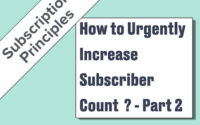Do’s and Don’ts of Subscription: Communicating the recurring nature of the product – 2/5
26/08/2024
This series covers what to do and what to avoid. Laws and regulatory authorities in the EU, UK, and US have similar guidelines. I’m not a lawyer, but I’ll share my opinion on avoiding trouble.
Definition and context
As explained in the previous article, a subscription is a contract to acquire a regular service for an indefinite period in exchange for regular payments.
Recurring payments differ from one-time purchases. Clearly communicate this to avoid customer dissatisfaction.
Regulators’ preference 👮
At acquisition:
They require to clearly and explicitly state:
- It’s a subscription (as opposed to a one-time purchase).
- It will automatically renew (because it’s initiated by the merchant).
- The price initially paid (at acquisition).
- The future renewal price (at retention).
- The time before the next payment.
At renewal:
They require customers to be informed:
- The subscription will continue to renew automatically.
👍 The Do’s 👍
At acquisition:
- Explicitly call out the services that are subscriptions. I use “Subscribe” purchase buttons rather than “Buy” buttons.
- Display the initial purchase price, the future renewal price next to the purchase/subscribe button.
- Explicitly capture explicitly customer’s consent for automatic renewal.
- Send a purchase confirmation email that reiterates the recurring nature of the service purchased.
At renewal:
- State the renewal is automatic in the communications before and after payment.
👎 The Don’ts 👎
At acquisition:
- Don’t hide information in a footer, footnotes or the Terms & Conditions page.
- Don’t use different font sizes to hide the renewal price. All prices are written in the same size and next to each other.
- Don’t select the automatic replenishment option by default, if you offer an automatic replenishment option along one-time purchase.
At renewal:
- Don’t leave any doubt concerning the automatic nature of the payment. Even call out the method of payment that will be used (i.e. last digit of a credit card or PayPal account name.)



